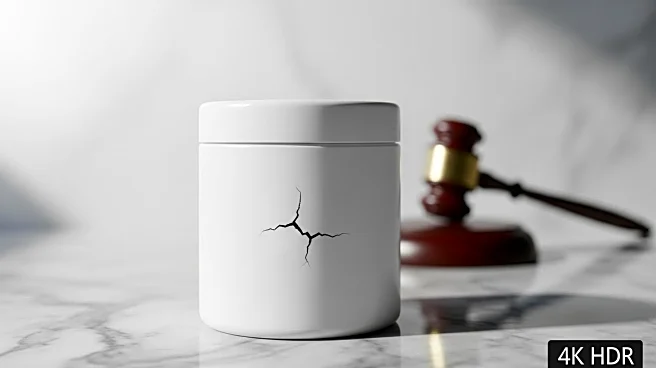What is the story about?
What's Happening?
Johnson & Johnson has been ordered by a Los Angeles jury to pay $966 million in damages to the family of Mae Moore, who died from mesothelioma, a rare lung cancer, at the age of 88 in 2021. The jury concluded that J&J's Baby Powder talc products were responsible for her illness. The verdict includes $16 million in compensatory damages and $950 million in punitive damages, marking the largest verdict against J&J in a mesothelioma case linked to talc. The jury found that J&J acted with malice or oppression by failing to protect consumers. J&J plans to appeal the verdict, arguing that it is unconstitutional and inconsistent with other talc cases where the company has prevailed.
Why It's Important?
This verdict is significant as it highlights ongoing legal challenges faced by Johnson & Johnson regarding its talc products. The substantial punitive damages could set a precedent for future cases, potentially impacting J&J's financial stability and reputation. The case underscores the broader implications for consumer safety and corporate accountability, as J&J has faced numerous lawsuits over alleged asbestos contamination in its talc products. The outcome may influence public policy and regulatory scrutiny concerning product safety standards and corporate practices.
What's Next?
Johnson & Johnson is expected to appeal the verdict, aiming to overturn the decision based on constitutional grounds. The appeal process could take several months or years, during which J&J will likely continue to face scrutiny and legal challenges. The company has already removed talc-based products from the market, opting for cornstarch alternatives. The appeal's outcome could affect J&J's strategy in handling similar lawsuits and its approach to consumer safety and product liability.
Beyond the Headlines
The case raises ethical questions about corporate responsibility and the extent to which companies should be held accountable for product safety. It also highlights the role of litigation-funded science in shaping legal outcomes, as J&J claims the verdict was influenced by 'junk science.' The long-term implications could include changes in how companies manage risk and communicate product safety to consumers.















